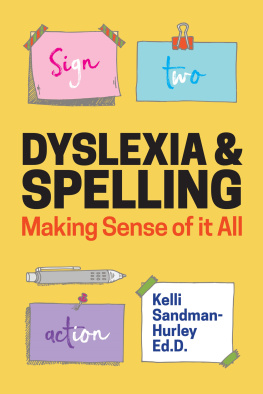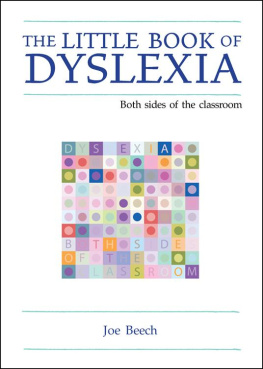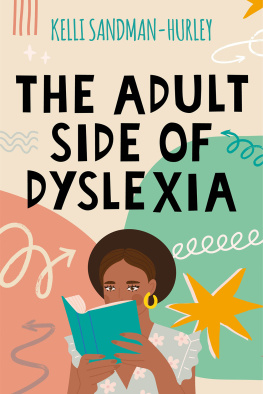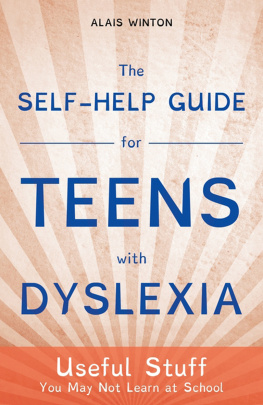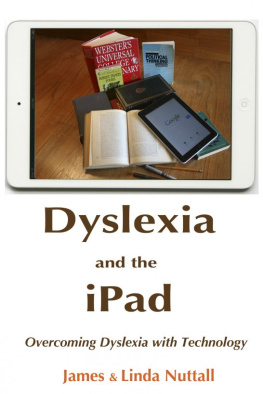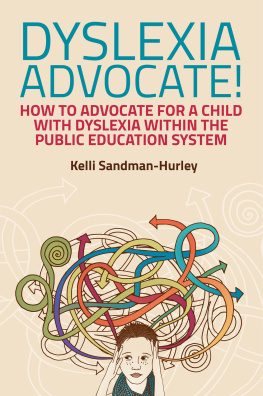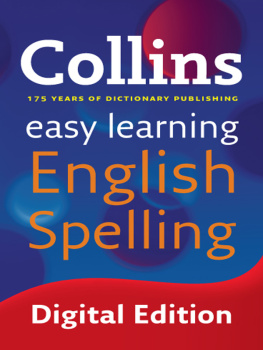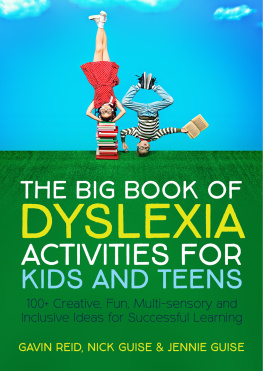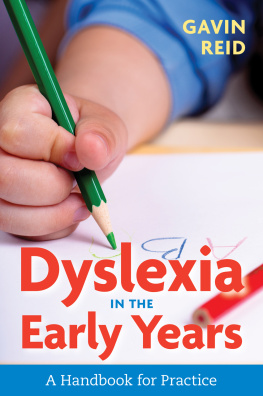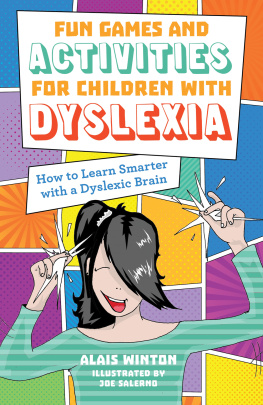
DYSLEXIA AND
SPELLING
Making Sense of It All
Kelli Sandman-Hurley

Jessica Kingsley Publishers
London and Philadelphia
Contents
Preface
I began my career in literacy working at the adult literacy program of the San Diego Public Library. During my time there I met hundreds of adults with low literacy skills who often cried when they spoke about their school experiences. They told stories of struggling to read to their children because of their own literacy struggles. They described the obstacles they faced in getting a new and/or better job because they could not spell. I remember one students emotional story about not being able to write a letter to his son because his spelling was so bad. Every single student I worked with included spelling as one of their literacy goals because they thought it was an important skill for their everyday lives. As I transitioned to helping younger dyslexic students and their families, I continued to seek out trainings that were based on evidence and widely accepted in the dyslexia community. I was trained and studied just about everything, but something was missing. There seemed to be so much emphasis placed on memorization techniques and lists of rules to apply. My students often asked me, Why? and I was left with the response, English is just crazy, now lets get back to that sight-word study method to help you memorize this crazy word.
I never believe that I know everything I need to know about reading and spelling. In fact, the more I learn the more I realize how much I still dont know. That openness led me to a meeting at a conference that changed my professional life forever and challenged everything I had been taught in every training I had ever attended.
I was at a dyslexia conference and I noticed that there was a bit of a frenzy at a booth near me in the convention hall. My initial thought was that it was another snake-oil salesman trying to dupe the dyslexia community to make some money. But as I sat and watched, I thought, there must be something there that is legitimate because that many people in this community cannot be duped. So, I walked over to Dr. Peter Bowers and said, Okay, so tell me what you are talking about here. He replied, Give me one English word that you think is crazy and nonsensical. I immediately gave him the word sign , which he wrote down on a cocktail napkin. We had a brief discussion about what sign means and within one minute we were talking about the connection in meaning and spelling between sign and signal . In that one minute I felt like someone had ripped the blindfold off my eyes. I couldnt believe I had gone through years and years of education about education and training after training about teaching English to struggling learners and not once did someone show me what Dr. Bowers showed me in less than one minute. I was immediately disappointed in my education, but more importantly, I was hyper-motivated to find out more. This was what my students needed: to see the connections between words and understand the whys of words, and be shown how to figure this out on their own, independently, like the curious, thoughtful individuals that they are.
Since that brief meeting, myself and my staff have been immersed in the studying of English orthography with others like the brilliant linguist at Real Spelling and Dr. Bowers, and the content of this book is heavily influenced and informed by their scientific (yes, linguistics is a science) work. As a professional in the dyslexia community I feel a great deal of responsibility to investigate all avenues and ideas that are presented to me; some are crazy and easy to dismiss and some are so compelling, like the lesson of sign , that it drives me to go back to school to understand as much as I can. It would be impossible to fit everything you should know about English to help our struggling students in a book like this, so I highly encourage you to continue your education past this book by consulting the resource section for valuable courses, blogs and instructional aids.
This book is intended to give you an introduction to why spelling is hard for students with dyslexia, and others, to help you understand and use the reading and spelling terms accurately and then offer some instructional strategies. This book is not a new program or approach, it is a resource to offer you, the professional, information that you can use to improve your students ability to understand how the English orthography is actually structured. Hopefully, by the end of the book you will feel confident enough to get excited when you and your student/s come to words that seems illogical and then investigate your way through the word to understand it together.
Most importantly, this book is about honesty and integrity. As the mother of an elementary (primary) school student, I want him to learn the truth about English. I know he is capable. I know his friends are capable. I know that he is interested, and I know his friends are interested. The information in this book is not new or something I created, it is not a program or a method or approach, it is just the facts about the English writing system and it is up to you to figure out how to deliver this book of truths to your students. There is a glossary at the end of the book that explains any terms related to spelling and writing.
Key to markings used in this book
When writing about English spelling in an accurate way, there are notations that can be used to differentiate when we are referring to phonetic and phonemic spellings.
< > | Letters between these symbols show the spelling of the word; they are a letter string and should be spelled out, not pronounced. | + |
// | Phonemic representation | table = /tebl/ catch = /kt/ |
[ ] | Phonetic representation | [dslksi] |
* | This indicates an incorrect spelling | * |
Orthography is the writing system of a language.
This is a book about helping struggling students understand English orthography . That understanding can shift the way we talk about the English writing system from memorization techniques and sounding-it-out strategies to discovering the reasons for spellings. This shift can improve our students attitudes towards spelling, because if we are constantly berating English as illogical, we send the message that it is pointless to try to understand it.
A phoneme is the smallest contrastive unit in the sound system of a language. The phonemes /b/ and /r/ distinguish the word bat from rat.
Phonetics is the term used to describe speech sounds. This includes the articulatory features to produce speech and the sounds that are produced.
In order to begin talking about spelling with students in an accurate way, we have to begin using, and understanding, the correct terminology, and we have to understand some basic spelling patterns before we guide the discovery process. And yes, I am suggesting using the terminology listed below with kids as young as kindergarten (year 1) age. If you think I am crazy, try it first. Think about this: we talk about dinosaurs with kids of this age without a second thought, using words like tyrannosaurus and triceratopswhy do we think the term phoneme is too hard for students?
Before you start on your journey, which I hope will be as eye-opening as mine was, consider this word:
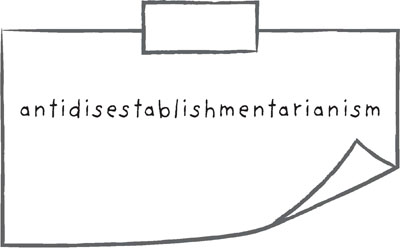
Next page
